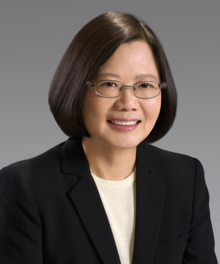Tsai Ing-Wen
| Tsai Ing-wen | |
|---|---|
| 蔡英文 | |
 |
|
| President of the Republic of China | |
|
Assumed office 20 May 2016 |
|
| Premier | Lin Chuan |
| Vice President | Chen Chien-jen |
| Preceded by | Ma Ying-jeou |
| Chairperson of the Democratic Progressive Party | |
|
Assumed office 28 May 2014 |
|
| Preceded by | Su Tseng-chang |
|
In office 27 April 2011 – 14 January 2012 |
|
| Preceded by | Ker Chien-ming (Acting) |
| Succeeded by | Chen Chu (Acting) |
|
In office 20 May 2008 – 17 March 2011 |
|
| Preceded by | Frank Hsieh (Acting) |
| Succeeded by | Ker Chien-ming (Acting) |
| Vice Premier of the Republic of China | |
|
In office 25 January 2006 – 21 May 2007 |
|
| Premier | Su Tseng-chang |
| Preceded by | Wu Rong-i |
| Succeeded by | Chiou I-jen |
| Member of the Legislative Yuan | |
|
In office 1 February 2005 – 24 January 2006 |
|
| Constituency | Republic of China |
| Minister of the Mainland Affairs Council | |
|
In office 20 May 2000 – 20 May 2004 |
|
| Premier |
Tang Fei Chang Chun-hsiung Yu Shyi-kun |
| Deputy | Chen Ming-tong |
| Preceded by | Su Chi |
| Succeeded by | Joseph Wu |
| Personal details | |
| Born |
31 August 1956 Taipei, Taiwan, Republic of China |
| Political party |
Independent (Before 2004) Democratic Progressive Party (2004–present) |
| Residence | Yonghe Residence |
| Alma mater |
National Taiwan University Cornell University London School of Economics |
| Signature | |
| Tsai Ing-wen | |||||||||||||||||||||||||||||||||||||
|
"Tsai Ing-wen" in Chinese characters
|
|||||||||||||||||||||||||||||||||||||
| Traditional Chinese | |||||||||||||||||||||||||||||||||||||
|---|---|---|---|---|---|---|---|---|---|---|---|---|---|---|---|---|---|---|---|---|---|---|---|---|---|---|---|---|---|---|---|---|---|---|---|---|---|
| Simplified Chinese | |||||||||||||||||||||||||||||||||||||
| Hanyu Pinyin | Cài Yīngwén | ||||||||||||||||||||||||||||||||||||
|
|||||||||||||||||||||||||||||||||||||
| Transcriptions | |
|---|---|
| Standard Mandarin | |
| Hanyu Pinyin | Cài Yīngwén |
| Bopomofo | ㄘㄞˋ ㄧㄥ ㄨㄣˊ |
| Gwoyeu Romatzyh | Tsay Ing'wen |
| Wade–Giles | Tsʻai4 Ying1-wên2 |
| Tongyong Pinyin | Cài Yingwún |
| Yale Romanization | Tsài Yīngwén |
| MPS2 | Tsài Yīng-wén |
| IPA | [tsʰâi̯ íŋ.u̯ə̌n] |
| Hakka | |
| Romanization | Tshai Yîn-vun |
| Yue: Cantonese | |
| Yale Romanization | Choi Yīng-màhn |
| Jyutping | Coi3 Jing1-man4 |
| Southern Min | |
| Hokkien POJ | Chhoà Eng-bûn |
| Tâi-lô | Tshuà Ing-bûn |
Tsai Ing-wen (Chinese: 蔡英文; pinyin: Cài Yīngwén; Pe̍h-ōe-jī: Chhoà Eng-bûn; born 31 August 1956) is a Taiwanese politician currently serving as the President of the Republic of China, commonly referred to as Taiwan. Tsai is the second president from Democratic Progressive Party (DPP). Tsai is also the first woman elected to the office. She is also the first president to be of Hakka and aboriginal descent (a quarter Paiwan from her grandmother), the first unmarried president, the first to have never held an elected executive post before presidency, and the first to be popularly elected without having previously served as the Mayor of Taipei. She is the incumbent chairperson of the Democratic Progressive Party (DPP), and was the party's presidential candidate in the 2012 and 2016 presidential elections. Tsai previously served as party chair from 2008 to 2012.
Tsai graduated in law and was subsequently a university professor. From 1993, she was appointed to a series of governmental positions by the then-ruling Kuomintang (KMT) and was one of the chief drafters of the special state-to-state relations doctrine of then President Lee Teng-hui.
After DPP President Chen Shui-bian took office in 2000, Tsai served as Minister of the Mainland Affairs Council throughout Chen's first term as a non-partisan. She joined DPP in 2004 and served briefly as a DPP-nominated at-large member of the Legislative Yuan. From there, she was appointed Vice Premier under Premier Su Tseng-chang until the cabinet's mass resignation in 2007. She was elected and assumed DPP chairpersonship in 2008, following her party's defeat in the 2008 presidential election. She resigned as chairperson after losing her 2012 presidential election bid.
...
Wikipedia
